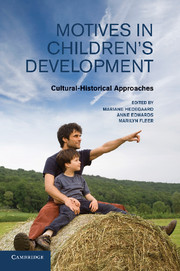Book contents
- Frontmatter
- Contents
- Figures
- Introduction
- Part One Motives, Emotions and Development
- Part Two Cultural Practice Motives and Development
- 5 The Development of Motives in Children’s Play
- 6 Developing Motivation through Peer Interaction
- 7 Developing Social Identities and Motives in School Transitions
- 8 Motives Matter
- 9 Motivation for School Learning
- Part Three Creating Conditions for Children’s Engagement
- Index
- References
6 - Developing Motivation through Peer Interaction
A Cross-Cultural Analysis
from Part Two - Cultural Practice Motives and Development
Published online by Cambridge University Press: 05 November 2011
- Frontmatter
- Contents
- Figures
- Introduction
- Part One Motives, Emotions and Development
- Part Two Cultural Practice Motives and Development
- 5 The Development of Motives in Children’s Play
- 6 Developing Motivation through Peer Interaction
- 7 Developing Social Identities and Motives in School Transitions
- 8 Motives Matter
- 9 Motivation for School Learning
- Part Three Creating Conditions for Children’s Engagement
- Index
- References
Summary
This chapter focuses on how peer interactions in play constitute a setting which contributes to the children’s acquisition of motives. We also argue that the study of peer interactions can shed light on two gaps which persist in the explanation of psychological development within the cultural-historical theory (Vygotsky, 1978; Wertsch, 1985). The first is that, although this theoretical approach has placed great emphasis on the social and cultural construction of psychological development, in this construction the role of adults such as caregivers and teachers is highlighted and that of peers has been neglected. The adults are seen as holding the keys to the cultural adult world, organising the interactions and regulating children’s behaviours in ways which give access to the cultural system of values and cultural norms. The second gap is, as Stetsenko and Arievitch (2004) point out, that although the cultural-historical theory recognises the active role of individuals in the appropriation of tools and systems of motives and cultural values, it has paid much less attention to the active role of individuals in creating and changing culture itself. Hedegaard (2005, 2008) has shown that the child is not a passive participant in these exchanges. The position, the way of behaving, and the degree of engagement of children in everyday practices can transform the practices substantially, playing a leading role in how these practices are developed. By focusing on peer interaction without adult direct supervision, we are able to analyse the active role of children acting in a setting in which they take over the values and norms of the adult world.
To illustrate this argumentation, we present a research on peer interaction in two different cultures. We will use the Corsaro’s (1997) concept of peer-cultures to analyse how children create and recreate the adult cultures in their interactions. The distinction between individualistic and collectivist cultures will be the backbone on which we will build our argument. Based on observational studies of pre-schoolers’ behaviour during free playtime at school, we show that the way children play and resolve their conflicts reflects and recreates the society’s motive system. We argue that peer interactions are a distinctive setting for socialisation and development in which children acquire the motives to act in relation to their adult world of reference.
- Type
- Chapter
- Information
- Motives in Children's DevelopmentCultural-Historical Approaches, pp. 97 - 114Publisher: Cambridge University PressPrint publication year: 2011



